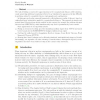Free Online Productivity Tools
i2Speak
i2Symbol
i2OCR
iTex2Img
iWeb2Print
iWeb2Shot
i2Type
iPdf2Split
iPdf2Merge
i2Bopomofo
i2Arabic
i2Style
i2Image
i2PDF
iLatex2Rtf
Sci2ools
109
click to vote
IACR
2016
2016
A Subgradient Algorithm For Computational Distances and Applications to Cryptography
The task of finding a constructive approximation in the computational distance, while simultaneously preserving additional constrains (referred to as "simulators"), appears as the key difficulty in problems related to complexity theory, cryptography and combinatorics. In this paper we develop a general framework to efficiently prove results of this sort, based on subgradient-based optimization applied to computational distances. This approach is simpler and natural than KL-projections already studied in this context (for example the uniform min-max theorem from CRYPTO’13), while simultaneously may lead to quantitatively better results. Some applications of our algorithm include: Fixing an erroneous boosting proof for simulating auxiliary inputs from TCC’13 and much better bounds for the EUROCRYPT’09 leakage-resilient stream cipher Deriving the unified proof for Impagliazzo Hardcore Lemma, Dense Model Theorem, Weak Szemeredi Theorem (CCC’09) Showing that "dense...
Biometrics | IACR 2016 |
Related Content
| Added | 03 Apr 2016 |
| Updated | 03 Apr 2016 |
| Type | Journal |
| Year | 2016 |
| Where | IACR |
| Authors | Maciej Skórski |
Comments (0)

